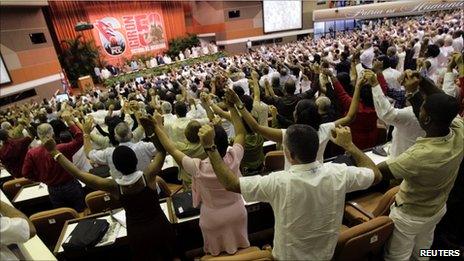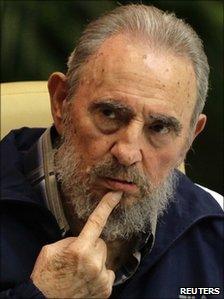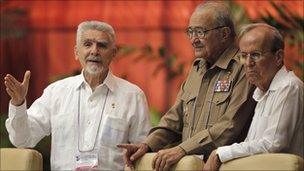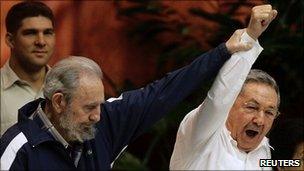Fidel Castro supports brother Raul at Cuba Congress
- Published

The first hint that something was afoot was as the party leaders gathered on the podium. President Raul Castro came in then paused, looked at the delegates and pointed his finger, smiling and nodding towards the entrance door.
Moments later his elder brother, Fidel Castro appeared, walking slowly but steadily supported by aides.
The entire hall erupted into thunderous applause. There were chants of "Fidel, Fidel," and many of the party faithful could be seen in tears.
The revolutionary icon made a limited number of public appearances last summer. But this was the first time that the Castro brothers had been seen side by side in public since 84-year-old Fidel underwent major surgery five years ago.
It was no coincidence that Fidel Castro chose to appear for the closing ceremony of the Communist Party Congress. The work was done, the decision made and he had in no way interfered in his younger brother's business.
Now he came to show his support for the important economic changes that Raul Castro had pushed through.
Brothers in arms
This could also be Fidel Castro's final farewell to the political stage.

Fidel Castro ruled Cuba for nearly half a century before finally stepping down
He has renounced all his official positions, including the head of the Communist Party which he founded back in 1965.
He could have had an honorary position in the party but turned it down. His only title now is "Historic Leader of the Revolution".
Today it is 79-year-old Raul Castro who is firmly in control.
At the opening of the Congress on Saturday, many Cubans were glued to the televisions and radios to listen to President Raul Castro's two and a half hour opening address, his longest ever.
Few had expected to hear him announce that from now on all senior politicians, including himself, should be limited to a maximum of two five-year terms - this in a country which Fidel had ruled for almost half a century before finally stepping down due to ill-health.
Unanimous vote
Raul Castro also spoke of the need to develop a new generation of younger leaders, in a move that surprised many.
"I didn't expect to hear that," said student Lazarita Martinez. "It's fantastic that in politics we'll be able to be like the rest of the world."
Even older Cubans, like 77-year-old pensioner Cristina Mesa, was impressed.
"It is very clear that the country has to give way to the young people and it has to trust them, there's no other choice," she said.
The BBC's Michael Voss says Fidel Castro's appearance is a sign of support for his brother
For two days the Congress split into five committees, each discussing different aspects of the economic and social changes planned.
It didn't make for gripping viewing. There was little real debate, it was more discussions on finer details and the wording of clauses.
Many of Havana's bars and cafes were showing entertainment channels instead.
In the end the new economic plan was voted in without a single hand raised against it.
Warring factions
The Cuban Communist Party is the model of Leninist discipline. If there are differences they never spill out into the open.
It's a far cry from last Communist Party Congress I attended, which was in Moscow in 1991.

Ramiro Valdez (left) fought alongside the Castro brothers in the Sierra Maestra mountains
President Gorbachev's Perestroika had loosened the political strings rather than the economic ones and Congress turned into a fractious affair.
The Communist Party was split into warring factions all of them eager to talk to the press.
There were the reformers grouped around Boris Yeltsin with Mikhail Gorbachev's supporters in the centre and the old guard centred around the KGB chief, Vladimir Kryuchkov, who later helped spearhead the coup.
The only of sign of dissent in Cuba came two years ago when the two younger politicians most widely tipped as possible future leaders were sacked in what could almost have been a Stalinist purge.
Foreign Minister Felipe Perez Roque and the de factor Prime Minister Carlos Lage were unceremoniously dumped and both wrote almost identical letters admitting to unspecified mistakes.
Fidel Castro wrote an editorial accusing them of being corrupted by "the honey of power".
Mixed message
In Saturday's speech calling for the need to rejuvenate the party, Raul Castro said that their past attempts at promoting young people showed that their choices "were not always good".
"Today we deal with the consequences of not having a reserve of substitutes who are properly prepared, with enough experience and maturity to assume the new and complex tasks of leadership in the Party, State and Government."

As expected, Raul Castro was elevated to the head of the communist party
When it came to the election of the new Communist Party leadership, the message was mixed.
As the name of each member of the newly elected Central Committee was read out, the winner stood up. Some were so old they could barely get to their feet, but there were a fair number of new younger faces, including a fair number of women and blacks.
The inner cabinet, the Politbureau, has been reduced from 24 to 15 members, of which three are newly appointed.
The most prominent arrival is the Marino Murillo who is in charge of pushing through the economic changes.
He is joined by one of the Havana party bosses, Mercedes Lopez, the only woman in the Politbureau, and Economics Minister Adel Izquierdo.
But the very top jobs remain firmly in the hands of the old guard.
As expected, Raul Castro was elevated to the head of the communist party.
But the number two spot went to his 80-year-old Vice-President, Machado Ventura, the number three to 79-year-old Ramiro Valdez.
Both fought alongside the Castro brothers in the Sierra Maestra mountains.
Lacking details
What most Cubans are now waiting to hear are just what the economic reforms entail?
The broad outlines are known but so far none of the finer details have been released.
Some of the changes are already underway. Private farmers have been given unproductive state owned land.
Some 180,000 Cubans have been granted licences to become self employed. Some have the right to hire labour which until now was considered capitalist exploitation.
The state will also take a step back devolving more decision making to local authorities, farms and industries.
But most of the economy will remain under state control.
Perhaps the biggest change is the recognition that the days of trying to create an idealistic egalitarian society are over.
Workers need incentives and the state can no longer afford its generous cradle to grave welfare state.
The social contract was that while wages are low, barely $20 (£12) a month, the state takes care over almost everything from housing to health, education and subsidised food from a ration card.
Subsidies will be phased out and at least a million workers could lose their jobs in overstaffed state enterprises.
The changes are a long way short of what has happened in other communist countries such as China and Vietnam.
But the 6th Communist Party Congress will likely be remembered as the one that set Cuba on the road towards market reform.